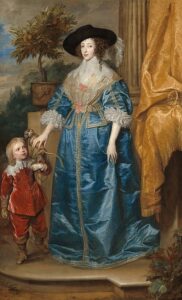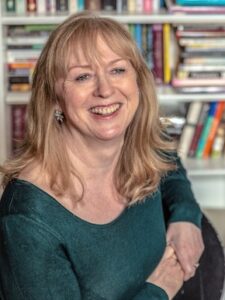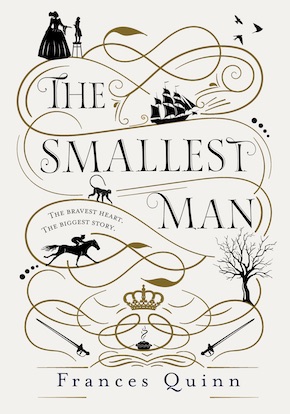A big thing or a small
by Frances QuinnFrances Quinn’s debut novel The Smallest Man is inspired by the real-life story of Jeffrey Hudson, who became ‘court dwarf’ and a true friend to Queen Henrietta Maria, the wife of Charles I. Spanning two decades that changed England forever, it’s a heartening tale of being different, but bold enough to follow your dreams.
Where are you now?
At home in Hove. I moved here with my husband and our cats two years ago – I’d always wanted to live by the sea, and I love the friendly, open-minded atmosphere of Brighton & Hove. You could walk down the street with a teapot on your head and no one would turn a hair (I don’t, but still…).
Where and when do you do most of your writing?
Boringly, in my office at home, mostly in the morning and usually with a cat asleep on the desk. I can’t do that thing of writing in coffee shops because I’m a shameless eavesdropper and spend the whole time tuning in to other people’s conversations.
How would you summarise your lockdown experience?
I work from home anyway, so that part is normal, and I’m waiting for a foot operation which means I can’t get around very well, so I haven’t missed out on much. Except the Eurovision Song Contest – for me that was like Christmas being cancelled. The thought that this virus could knock out something that’s so innocent and joyful just seemed so sad.
If you have one, what is your pre-writing ritual?
Clean out the cat litter tray, and make a cup of instant coffee. Very much the rock ’n’ roll lifestyle.
Full-time or part-time?
I write full-time but only some of those words go into books. I’m a freelance copywriter, and a lot of the words I write are the ones nobody really realises they’re reading – the description on a pizza box, the notice about social distancing, the poster featuring the farmer who reared your steak. My main client is Waitrose and if you shop there, you’ll almost certainly have some of my words in your cupboard or fridge.
Pen or keyboard?
Keyboard. My handwriting’s so bad even I can’t read it. I do write notes when I’m planning, because it helps me think, but I don’t need to read them back – if an idea doesn’t stay in my head, it’s not worth keeping. It’s my adaptation of the way Björn and Benny from ABBA wrote songs. They couldn’t do musical notation, so they’d play around on the piano and guitar, and if a melody stuck, they knew it was worth working on. Worked pretty well for them.
How do you relax when you’re writing?
When it’s going well, I just am relaxed; I feel totally at peace with the world. When it’s going badly, no amount of scented candles, whale music or even gin will do the trick.

Queen Henrietta Maria with Sir Jeffrey Hudson by Sir Anthony van Dyck, 1633. National Gallery of Art, Washington, DC
How would you pitch your latest book in up to 25 words?
Nat Davy is the smallest man in England – but he has a big story to tell.
Who do you write for?
I write what I’d like to read; I don’t know how else to do it.
Who do you share your work in progress with?
My writing buddies Kate Clarke and Lucy Smallwood Barker, who I met on the Curtis Brown Creative novel-writing course six years ago. Over the years, they’ve dug me out of some very deep plot holes, and I can’t wait until the world gets to read the books they’re working on. Lucy’s is a brilliant historical novel about a feud between two Victorian mediums, and Kate’s is a really lovely feelgood book set in Japan about loneliness and the different, sometimes strange ways human beings deal with it.
Which literary character do you wish you created?
Paddington Bear. How fantastic must it be for a character that both children and adults love so much to have come out of your head?
Share with us your favourite line/s of dialogue, poetry or prose.
Can I have a song lyric? As you might have guessed by now, I’m a massive ABBA fan, and I think Björn Ulvaeus’ lyrics are hugely underrated – people say they’re cheesy but he is an absolute genius at painting a picture in a handful of lines. So many to choose from but I’ll go for this from ‘The Winner Takes It All’:
The gods may throw a dice
Their minds as cold as ice
And someone way down here
Loses someone dear
And then he gets his ex-wife to sing it.
Which book do you wish you’d written?
I can’t imagine wanting to write someone else’s book, but I’d love to be able to write like Anne Tyler, Clare Chambers or Lissa Evans. I like writing that’s quite pared back, wryly funny and that looks effortless even though it can’t be; all three of them have those qualities.
Which book/s have you most recently read and enjoyed?
I loved Small Pleasures by Clare Chambers so much that I immediately bought everything else she’s ever written. I read a lot of crime and thrillers – favourites this year have been The Silence by Susan Allott, a murder mystery set in Australia that sets the scene so well you actually feel hot and sweaty reading it; All in Her Head, a psychological thriller by Nikki Smith that really played with my head; and The Man on the Street by Trevor Wood, a crime story with a homeless ex-soldier as the ’detective’. And like a lot of people at the moment, I’m drawn to feelgood stories – I loved Tim Ewins’ quirky love story We Are Animals, Matson Taylor’s The Miseducation of Evie Epworth, Beth Morrey’s Saving Missy and Nicola Gill’s The Neighbours.
What’s on your bedside table or e-reader?
I often read non-fiction in bed, at the moment it’s Wayfaring by Michael Bond (not the Paddington one), which is about how and why human beings learn to find their way around spaces and places. It’s fascinating.
Which books do you feel you ought to have read but haven’t yet?
I don’t really do ‘ought’, not in life and definitely not in reading. Books should be a pleasure, not a duty. Which is probably why I disliked studying English Literature at university and didn’t do very well in my exams, and why I would never join a book club.
Which book/s do you treasure the most?
A copy of Sprängaren by Liza Marklund (The Bomber in English). As a child, because of ABBA, I always wanted to go to Sweden, and when I finally did about 20 years ago, I loved it and knew I’d go back again and again. I think if you’re going to do that, it’s rude not to learn the language, so I started evening classes, and this was the first Swedish book I ever read without the aid of a dictionary. It’s an absolutely brilliant thriller, which helped.
What is the last work you read in translation?
One of Yrsa Sigurdardottir’s Icelandic crime novels.
Which story collections would you particularly recommend?
I don’t read short stories, I like a book I can get lost in.
What are you currently reading?
A proof copy of Marika Cobbold’s new one, On Hampstead Heath, her first for ten years. I’m a huge fan of hers, and we’ve chatted a bit on Twitter, so I was beyond excited when I was offered a sneak preview.
What are you working on next?
My second book, which is set in 18th-century London, and is about a young woman called Endurance Proudfoot who wants to be a bonesetter. It wasn’t considered a woman’s job, because you have to be strong to manipulate bones, but Endurance is stronger than quite a lot of men, and she’s not taking no for an answer. The story also involves a manipulative sister who becomes the subject of Georgian England’s surprisingly modern celebrity culture, a baby left at the Foundling Hospital, a feud with the medical profession, a faithless husband and the lions that lived at the Tower of London. It’s a lot of fun to write so I hope it’ll be fun to read.
Imagine you’re the host of a literary supper, who would your dinner guests be (living or dead, real or fictional)?
At the start of 2020, I joined a Facebook group for authors with debut novels coming out that year, as mine was originally planned to. We bonded over the bizarre experience of launching into a pandemic, and it’s transcended Facebook to become something quite special to all of us. On weekly Zoom chats, we’ve commiserated over bad news (hardbacks that never made it out of the warehouse; book signings cancelled) and celebrated good (awards, even if the ceremonies were only virtual; TV deals, even if no one knows when it’ll be safe to film them), and I think we’d all say we consider each other friends now. But thanks to Covid, we’ve never met, so I’d invite all of them.
If you weren’t writing you’d be…?
A bit miserable and lost. Writing’s like pulling teeth sometimes – actually, a lot of the time – but even though I’m not always happy when I’m sitting at the keyboard doing it, having it in my life, to the extent that people are paying me money to do it, and strangers are reading my book, is a dream come true and makes me happier than I’ve ever been.
 Frances Quinn grew up in London and studied English at King’s College, Cambridge. She has worked as a journalist for Prima, Good Housekeeping, She, Woman’s Weekly and Ideal Home, and later branched out into copywriting. The Smallest Man is published by Simon & Schuster in hardback, eBook and audio download.
Frances Quinn grew up in London and studied English at King’s College, Cambridge. She has worked as a journalist for Prima, Good Housekeeping, She, Woman’s Weekly and Ideal Home, and later branched out into copywriting. The Smallest Man is published by Simon & Schuster in hardback, eBook and audio download.
Read more
@franquinn
@simonschusterUK
Author portrait © Owen Boyd


